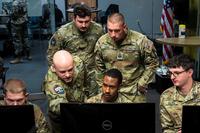As the conflict between Israel and Hamas rages, U.S. military and government officials were quick to condemn the surprise attack, but on Tuesday were keeping American military might focused on deterrence, intelligence and hostage efforts.
The possibility of direct American military involvement appeared unlikely, as the world rallied around Israel and condemned the bloody terrorist attack by Hamas over the weekend that sparked the war. There are no plans to put "boots on the ground," the State Department said in a press conference Tuesday.
Defense and White House officials have categorized the movement of U.S. military assets to the region as an act of deterrence -- a stern warning to malignant actors in the area to keep away from taking advantage of the chaos embroiling the Middle East.
Read Next: Troops Suing Defense Department over Vaccine Mandate Reach $1.8 Million Settlement
To date, the largest, publicly announced shift in American troop posture came Sunday when Defense Secretary Lloyd Austin announced that he was repositioning the Navy's newest aircraft carrier, the USS Gerald Ford, along with four destroyers and a cruiser, to the area. The Ford announced it was in the area of the eastern Mediterranean Sea via social media Tuesday afternoon.
"The United States has also enhanced our military force posture in the region to strengthen our deterrence," President Joe Biden said Tuesday. "Let me say again to any country, any organization, anyone thinking of taking advantage of this situation. I have one word: Don't."
On Monday a senior defense official told reporters that "a US military security cooperation team” was at the embassy “working to deepen military cooperation with Israel” and that they had been there “for years now.”
Later, a senior Pentagon official confirmed to Military.com on Tuesday evening that there were currently no plans to deploy American troops to Israel for the purpose of engaging in combat.
However, “special operations personnel were already on the ground in Israel as part of their jobs at the Embassy or in support of unit-to-unit bilateral training agreements between U.S. and Israeli special operations,” the official said. “They have offered to help with hostage recovery efforts.”
While the Ford and her five accompanying ships have significant firepower, officials have stressed that the strike group offers military leaders a "full spectrum of missions" -- not just the ability to conduct long-range strikes.
A Defense Department spokesperson also noted that the carrier USS Dwight D. Eisenhower, along with her strike group, will deploy "in the coming week" to Europe from Norfolk, Virginia, but the spokesperson, along with Navy officials, stressed that it was a regularly scheduled deployment and not a response to the Israeli conflict.
The spokesperson did add that Austin "will continue to review both the Eisenhower and Ford's deployment plans as he considers the appropriate balance of maritime capability across theaters in support of national security priorities."
Hamas' sudden assault into Israel with gunmen and rockets on Saturday took many officials and experts by surpise in its brutality and viciousness. The senior defense official described it as unprecedented and "ISIS-level savagery," with Hamas militants "going across Israel murdering children in front of their parents, massacring with indiscriminate violence in music festivals, burning down entire houses while families sheltered in their bunkers."
Israel's Prime Minister, Benjamin Netanyahu, in return promised to "exact a price that will be remembered by them, and Israel's other enemies, for decades to come."
Military.com spoke to two Middle East experts on Tuesday who both said that a direct conflict between regular U.S. forces and militants in the region is unlikely, though one noted a few important caveats that rest in the hands of presidential, congressional and defense authorities.
"The U.S. military role is primarily to stabilize the region and deter additional actors from opportunistically choosing to join in the fight against Israel," Jonathan Lord, a senior fellow and director of the Middle East security program at the Center for a New American Security think tank, told Military.com on Tuesday.
Like officials in the Pentagon, Lord said Hezbollah, the U.S.-designated terrorist group to Israel's north, is one of the main concerns.
"Primarily, the U.S. military is going to be tasked with providing … logistics to resupply the Israeli military during its fight," Lord said, adding that Israel has requested precision-guided missiles and interceptors for its Iron Dome from the U.S., according to CNN.
Biden confirmed those munitions Tuesday and said that the U.S. would "make sure that Israel does not run out of these critical assets to defend its cities and its citizens."
Meanwhile, thousands of U.S. citizens, some with dual citizenship, live in Israel and in harm's way.
State Department spokesman Matthew Miller said Tuesday that 14 American citizens have died in the conflict so far and 20 more remain unaccounted for -- though that number appears fluid. Miller also said that the "first tranche of security assistance is on its way and will arrive in the coming days, and more will follow."
"The president could potentially -- if the threat is warranted -- introduce the U.S. into hostilities in order to protect American lives," Lord said. "I don't believe that is under discussion at this time, but those are the avenues by which the U.S. could find itself directly in conflicts with Hamas or others."
Should hostilities become necessary, having the Ford carrier strike group in the Eastern Mediterranean gives Biden options, including intelligence sharing, non-combatant evacuation operations, and defense capabilities, Lord noted.
"Wherever they are, the U.S. military retains the right to self-defense," Lord said.
Zack Gold, a research scientist with the Center for Naval Analyses, said that U.S. deterrence is important for keeping Iran and its proxies at bay while Israel embarks on what is shaping up to be a grueling ground and artillery campaign in Gaza.
"We think of Israel as a very small country, but to them it's attacks from two sides of the country," said Gold, whose specialization is working with U.S. partners in the Middle East, including in the maritime domain, referencing the threat of Hezbollah lurking to the north in Lebanon.
"So, certainly one of the priorities for the U.S. [forces] flowing in is making sure that groups other than Hamas, groups outside of Gaza -- and of course their overall state sponsor, Iran -- stay out of the fight," he said.
The tension between Washington and Tehran has been mounting in the region since Iran began harassing commercial vessels in the Persian Gulf, Gold said. The U.S. sent additional forces to the region as recently as this summer as a result, so there is a precedent for the buildup of U.S. maritime deterrence there.
Gold also said that intelligence cooperation between partners -- including to confirm whether there was any state-sponsored connection to the Hamas attack -- would certainly be key moving forward, an effort that Israel may be looking to bolster after initial failures.
"Certainly, Israel thought it could take its eye off the ball in Gaza, and it has paid a very steep price not just in its military, but in hundreds of civilians killed for doing so," Gold said, alluding to the West's shift to near-peer threats. "While obviously the U.S. military needs to prioritize, it does also need to realize that there are areas where they shouldn't take their eye off the ball.
"We have declared an end to the war on terror," Gold said. "Terror groups have not necessarily agreed to that end."
Editor's note: This story was updated with additional information from a senior Pentagon official.
-- Drew F. Lawrence can be reached at drew.lawrence@military.com. Follow him on X @df_lawrence.
-- Konstantin Toropin can be reached at konstantin.toropin@military.com. Follow him on X @ktoropin.
Related: Despite Talk, No Evidence Marines Have Boarded Commercial Vessels in Persian Gulf













